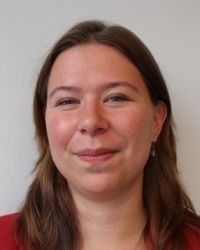Introducing Renske Janssen
Renske Janssen started her PhD project at LUCAS and LUIH in October 2015. Her project is part of the research field ‘History and Culture of Ancient Judaism and Early Christianity’, supervised by Jürgen Zangenberg.
 Renske obtained both her Bachelor’s degree in Greek and Latin Language and Culture and her Research Master in Classics and Ancient Civilizations at Leiden University. During her BA, she became fascinated with the way in which governments attempt to regulate religious life by participating in the Honours College Religion and Law. ‘Legislation is a fascinating tool for historical research,’ Renske explains. ‘It not only influences people’s daily lives, but also demonstrates what ideas and values were seen as central by the society that created them. In their own way, laws are very interactive.’ During her MA, she participated in an Erasmus+ exchange to the University of Cambridge, and found the opportunity to unite her interests in religion on the one hand, and law and politics on the other hand, once again. Renske: ‘During my conversations with my supervisor, it became clear that I wanted to focus on Roman legislation on Judaism for my MA thesis. But I also realized that the subject of Roman religious legislation was just too expansive – and too interesting – to be left alone after that.’
Renske obtained both her Bachelor’s degree in Greek and Latin Language and Culture and her Research Master in Classics and Ancient Civilizations at Leiden University. During her BA, she became fascinated with the way in which governments attempt to regulate religious life by participating in the Honours College Religion and Law. ‘Legislation is a fascinating tool for historical research,’ Renske explains. ‘It not only influences people’s daily lives, but also demonstrates what ideas and values were seen as central by the society that created them. In their own way, laws are very interactive.’ During her MA, she participated in an Erasmus+ exchange to the University of Cambridge, and found the opportunity to unite her interests in religion on the one hand, and law and politics on the other hand, once again. Renske: ‘During my conversations with my supervisor, it became clear that I wanted to focus on Roman legislation on Judaism for my MA thesis. But I also realized that the subject of Roman religious legislation was just too expansive – and too interesting – to be left alone after that.’
Misconceptions
In her PhD research, Renske will focus on the way in which the workings of the Roman legal system influenced the interaction between the Roman state and Judeo-Christian groups within its territories. ‘It is a topic about which a lot of misconceptions continue to exist. Especially when it comes to the treatment of Christians, people often think that the Roman state had a single, coherent policy, and that this policy was essentially repressive. In other areas of Roman law, however, it has been observed that many regional differences between the various provinces of the Roman Empire existed. However, this idea has largely been neglected by those who study the position of Judaism and Christianity in the Roman world. In my research, I will attempt to study these two groups from a legal angle, to see to what extent Judaism and Christianity were unique. This also includes comparing these two monotheistic religions to other religious groups that were confronted with Roman legislation, to see whether the Roman state followed systematic patterns in its approach to religion in general.’
Social relevance
‘I think most of us are confronted with questions about the relevance of our chosen subject at some point during our studies, but especially when pursuing a PhD. In the case of my project, I think the similarities with the current situation in the European Union are not hard to find. After all, both the EU and the Roman Empire encompass a great many, very different areas, each with their own traditions and pre-existing laws. In addition, both ‘empires’ incorporate an increasing number of religious groups, and have to deal with the inclusion of these groups in its political and social life. That is not to say that we should see the Romans as an example in this, of course. But the question how people deal with legal and religious heterogeneity nevertheless remains interesting, and relevant, today. Religion, whether ancient or modern, tends to evoke strong feelings, and I think it is very important to provide nuance where possible.’
